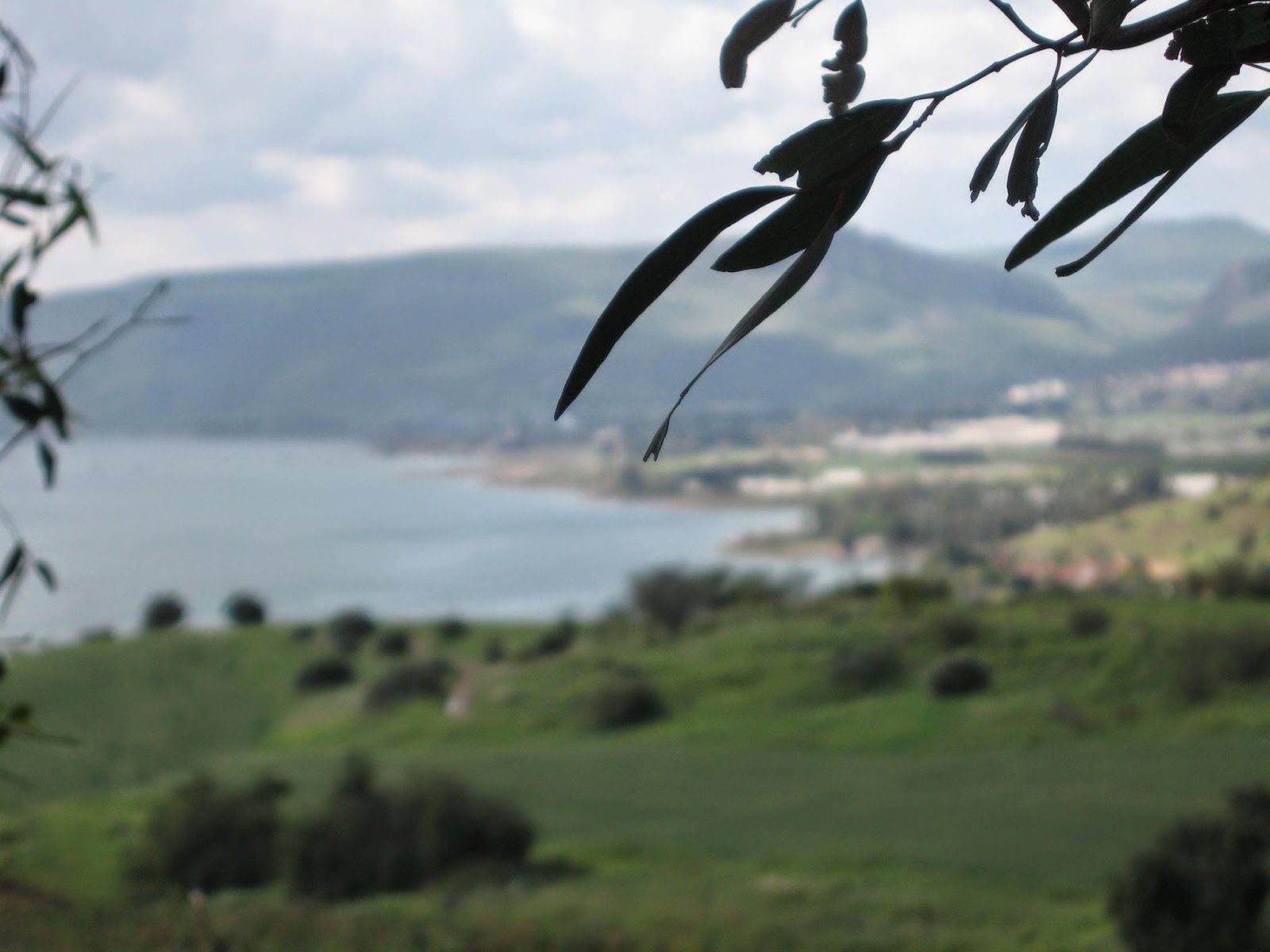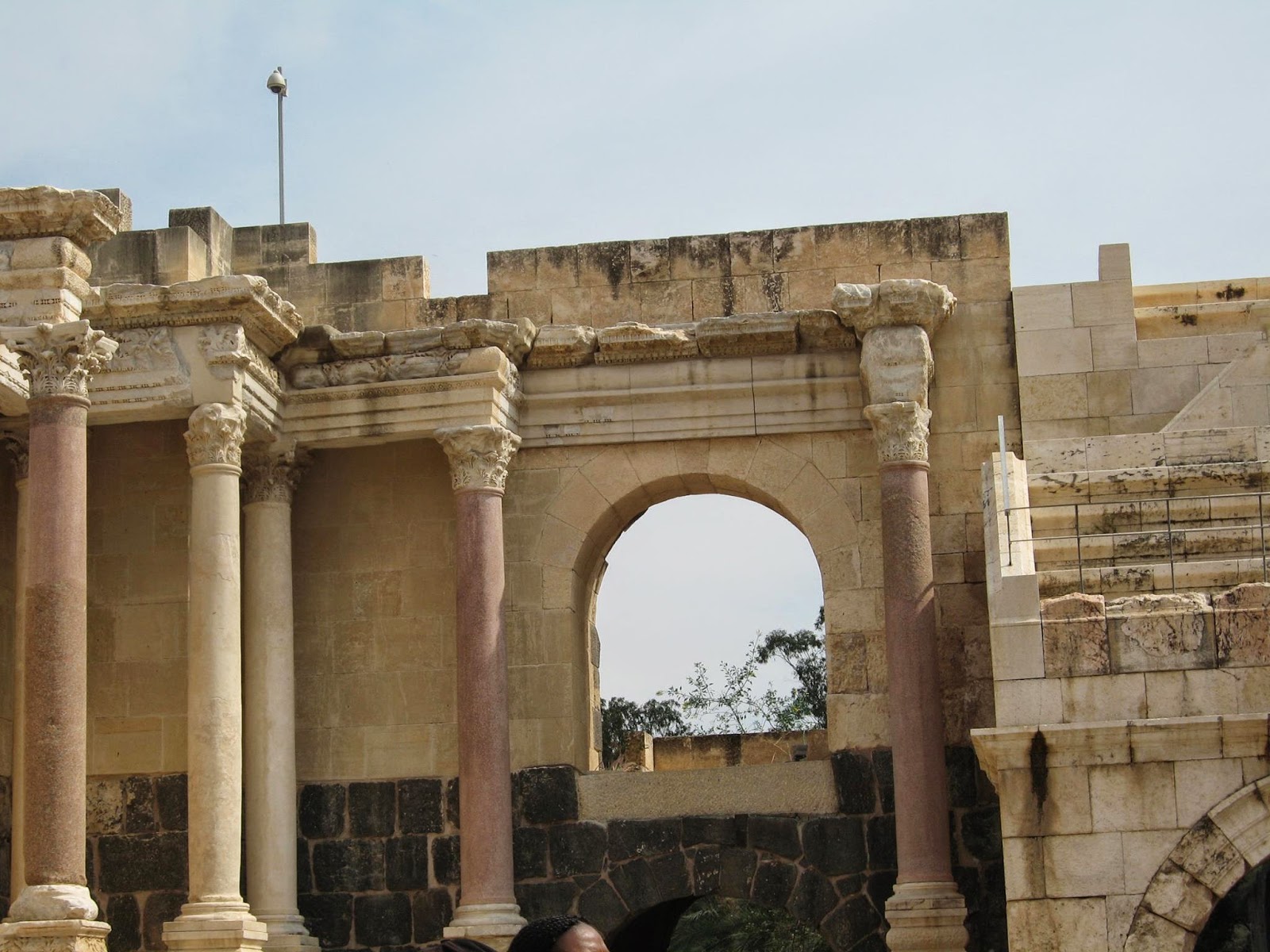Day 2:
A pic of the day, from the Basilica of the Annunciation, in Nazareth.
Definitely more pix to come. Arrival yesterday in Tel Aviv (Day 1), and a long
walk along the Mediterranean before dinner. Today, traveled north to Caesarea
Maritima, on to the Monastery of the Carmelites, then to Megiddo, before
heading into Galilee. Not nearly enough time in Nazareth before making our way
to Tiberias this evening. Tomorrow? On to the Sea of Galilee.onastery of the Carmelites, then to Megiddo,
before heading into Galilee. Not nearly enough time in Nazareth before making
our way to Tiberias this evening. Tomorrow? On to the Sea of Galilee.
Day 3:
They cast their nets in Galilee,
just off the hills of brown,
such happy simple fisherfolk
before the Lord came down.
We began Day 3 of our adventure sailing across the Sea of
Galilee, and the words of this hymn rang in my mind. It was a perfect morning
for the sail: sunny, just a bit of a breeze, utterly beautiful, a perfect day
to envision the first four disciples – Simon Peter, Andrew, James and John –
putting down their nets and following Jesus. Viewed an actual fishing boat dating
from the first century. Enjoyed a lunch of cooked fish. Visited the Church of
the Beatitudes and the Church of the Multiplication of the Loaves and Fishes.
Then on to Capernaum and Caesarea Philippi, and a glimpse across the Syrian
border. Full day, and so wonderful. Tomorrow? On to the Jordan River, and
making our way to Jerusalem.
erfect morning
for the sail: sunny, just a bit of a breeze, utterly beautiful, a perfect day
to envision the first four disciples – Simon Peter, Andrew, James and John –
putting down their nets and following Jesus. Viewed an actual fishing boat
dating from the first century. Enjoyed a lunch of cooked fish. Visited the
Church of the Beatitudes and the Church of the Multiplication of the Loaves and
Fishes. Then on to Capernaum and Caesarea Philippi, and a glimpse across the
Syrian border. Full day, and so wonderful. Tomorrow? On to the Jordan River,
and making our way to Jerusalem.
Day 4:
Today began on the Jordan River, where we
witnessed several people of different nationalities being baptized. Amazing to
hear so many languages being spoken as our shared faith was affirmed. We drove
along the Jordan border, stopping at the magnificent ruins of Bet She’an as we
made our way into the Judean desert. Near Jericho, we saw shepherds in the hill
country, tending their sheep. (And we took time for a little camel-riding fun
ourselves!) We made our way into Jerusalem, taking in the magnificent views. A
stop at the Mount of Olives was followed by a time of prayer and reflection at
the Church of All Nations and the Garden of Gethsemane. The highlight of the
day, though, was spending time with my dear friend, Sara’s, beautiful family.
Tomorrow? On to the Old City, and the Via Dolorosa.
magnificent ruins
of Bet She'an as we made our way into the Judean desert. Near Jericho, we saw
shepherds in the hill country, tending their sheep. (And we took time for a
little camel-riding fun ourselves!) We made our way into Jerusalem, taking in
the magnificent views. A stop at the Mount of Olives was followed by a time of
prayer and reflection at the Church of All Nations and the Garden of
Gethsemane. The highlight of the day, though, was spending time with my dear
friend Sara Benin's beautiful family. Tomorrow? On to the Old City, and the Via
Dolorosa.
Day 5:
“So they took Jesus; and carrying the cross by himself,
he went out to what is called The Place of the Skull, which in Hebrew is called
Golgotha. There they crucified him, and with him two others, one on either
side, with Jesus between them. Pilate also had an inscription written and put
on the cross. It read, ‘Jesus of Nazareth, the King of the Jews.’ Many of the
Jews read this inscription, because the place where Jesus was crucified was
near the city; and it was written in Hebrew, in Latin, and in Greek.”
A moving day, making our way with other
pilgrims of many other countries and tongues along the Via Dolorosa, ending up
at the Church of the Holy Sepulchre, traditionally believed to be the site of
Jesus’ Crucifixion, burial and Resurrection. Comparing the arch. Pilate also had an inscription written and
put on the cross. It read, ‘Jesus of Nazareth, the King of the Jews.’ Many of
the Jews read this inscription, because the place where Jesus was crucified was
near the city; and it was written in Hebrew, in Latin, and in Greek.”
A moving day, making our way with other pilgrims of many other countries and
tongues along the Via Dolorosa, ending up at the Church of the Holy Sepulchre,
traditionally believed to be the site of Jesus' Crucifixion, burial and
Resurrection. Comparing the archaeological evidence from the more recently
recognized Garden Tomb. Experiencing the confluence of cultures – Jewish,
Christian and Muslim – in the sights, sounds and smells of the Old City.
Tomorrow? To Bethlehemaeological evidence from the more recently
recognized Garden Tomb. Experiencing the confluence of cultures – Jewish,
Christian and Muslim – in the sights, sounds and smells of the Old City.
Tomorrow? To Bethlehem.
Day 6:
“In those days a decree went out from Emperor Augustus
that all the world should be registered. This was the first registration and
was taken while Quirinius was governor of Syria. All went to their own towns to
be registered. Joseph also went from the town of Nazareth in Galilee to Judea,
to the city of David called Bethlehem, because he was descended from the house
and family of David. He went to be registered with Mary, to whom he was engaged
and who was expecting a child. While they were there, the time came for her to
deliver her child. And she gave birth to her firstborn son and wrapped him in
bands of cloth, and laid him in a manger, because there was no place for them
in the inn.”
Much to take in today in
Bethlehem...Crossing a barbed-wired, walled border from Jerusalem into this Palestinian-occupied
city, and seeing armed militia walking along the streets as we made our way to
the Church of the Nativity, I was struck that the world which now surrounds the
stable-place is probably not much different than the world into which the Son
of God was born. And, a moving visit to Yad Vashem, Israel’s Holocaust Museum,
offered another sobering reminder of the atrocities that humans have committed
against one another. Prayer time at the Wailing Wall this evening became a
fitting close for this emotional day. Tomorrow? Off to the Dead Sea.
Day 7:
Qumran and the Dead Sea...even though I've known the
story of the Dead Sea Scrolls, seeing the area is incredible. Grateful for the
faithfulness of the Essenes to preserve the ancient writings for future
generations and for the perseverance and care of those who brought them to
light.
Wrapping up:
“The angel said to her, ‘The Holy Spirit will
come upon you, and the power of the Most High will overshadow you; therefore
the child to be born will be holy; he will be called Son of God. And now, your
relative Elizabeth in her old age has also conceived a son; and this is the
sixth month for her who was said to be barren. For nothing will be impossible
with God.’ Then Mary said, ‘Here am I, the servant of the Lord; let it be with
me according to your word.’ Then the angel departed from her.”
There could be no more fitting end to this
journey than to visit the Church of John the Baptist and the Church of the
Visitation of Mary and Elizabeth. Mary and Elizabeth are the image of hope and
expectation, and possibility in the face of impossibility. Elizabeth’s son,
John the Baptist, born to her in her old age, would obey the call of God to go
out into the world and prepare the way for the coming of God’s Son. And that
Son, born to the Virgin Mary, would heal the sick, feed the hungry, teach the
lost and give hope to the hopeless before giving up his own life on a cross.
May we all be encouraged by Mary and Elizabeth’s faithfulness; may we all be
strengthened by their courage. May we all find possibility in the face of
impossibility – through God, who makes all things possible. Let it be with all
of us, according to God’s holy word.
ent from the town
of Nazareth in Galilee to Judea, to the city of David called Bethlehem, because
he was descended from the house and family of David. He went to be registered
with Mary, to whom he was engaged and who was expecting a child. While they
were there, the time came for her to deliver her child. And she gave birth to
her firstborn son and wrapped him in bands of cloth, and laid him in a manger,
because there was no place for them in the inn.”
Much to take in today in Bethlehem…Crossing a barbed-wired, walled border from
Jerusalem into this Palestinian-occupied city, and seeing armed militia walking
along the streets as we made our way to the Church of the Nativity, I was
struck that the world which now surrounds the stable-place is probably not much
different than the world into which the Son of God was born. And, a moving
visit to Yad Vashem, Israel’s Holocaust Museum, offered another sobering
reminder of the atrocities that humans have committed against one another.
Prayer time at the Wailing Wall this evening became a fitting close for this
emotional day. Tomorrow? Off to the Dead Sea.





















